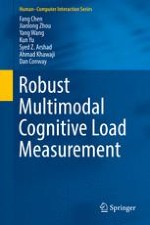2016 | OriginalPaper | Buchkapitel
3. Theoretical Aspects of Multimodal Cognitive Load Measures
verfasst von : Fang Chen, Jianlong Zhou, Yang Wang, Kun Yu, Syed Z. Arshad, Ahmad Khawaji, Dan Conway
Erschienen in: Robust Multimodal Cognitive Load Measurement
Aktivieren Sie unsere intelligente Suche, um passende Fachinhalte oder Patente zu finden.
Wählen Sie Textabschnitte aus um mit Künstlicher Intelligenz passenden Patente zu finden. powered by
Markieren Sie Textabschnitte, um KI-gestützt weitere passende Inhalte zu finden. powered by
